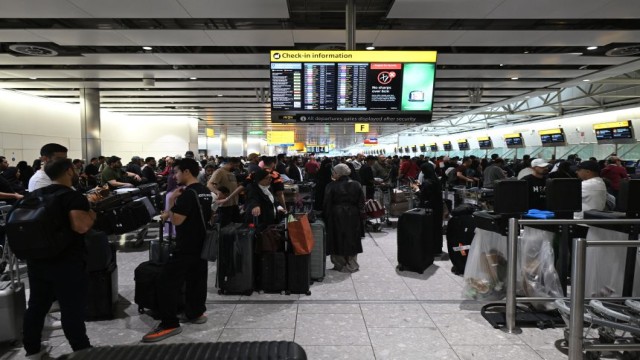BRUSSELS/BERLIN, Sept 22 (V7N) – Several major European airports faced operational challenges on Sunday after a cyberattack disrupted automated check-in systems, with Brussels Airport asking airlines to cancel half of Monday’s scheduled departures due to ongoing technical issues.
The attack, which occurred on Friday, targeted Collins Aerospace, a check-in and boarding systems provider owned by RTX. The disruption affected operations at London’s Heathrow, Berlin Brandenburg Airport, and Brussels Airport.
Passengers experienced long queues, flight delays, and cancellations on Saturday. While conditions improved in Berlin and London by Sunday, Brussels continued to face significant delays. A spokesperson for Brussels Airport confirmed that Collins Aerospace had not yet delivered a secure, updated software version required to fully restore operations, prompting preemptive flight cancellations for Monday.
On Sunday, Brussels Airport cancelled 50 of its 257 scheduled departures, compared with 25 of 234 outbound flights the previous day, to prevent excessive congestion and last-minute cancellations.
RTX said on Saturday that it was working to resolve the issue as quickly as possible, and that manual check-in could mitigate some disruptions. Its MUSE software, used by several airlines, was affected.
A passenger departing from Brussels noted minimal disruption to his travel, stating, “For me, it was business as usual. For those who didn’t check in online or had baggage to check, they may have waited longer.”
Berlin Brandenburg Airport reported that while some issues persisted, manual procedures were in place. “Occasionally, there are longer waiting times at check-in, boarding, baggage handling, and reclaim,” the airport said. “Delays to departing flights today are in line with a normal operating day.”
Heathrow Airport said early Sunday that recovery work was ongoing but added that the vast majority of flights continued to operate. Aviation data provider Cirium reported that Heathrow faced low delays, Berlin experienced moderate delays, and Brussels had significant delays.
European regulators are investigating the source of the hack, the latest in a series of cyberattacks affecting sectors from healthcare to automotive. Previous incidents include Jaguar Land Rover halting production and Marks & Spencer incurring hundreds of millions of pounds in losses.
News Source: Reuters
END/WD/SMA/































Comment: